Star Trek TOS - Season 3 - Episode 08
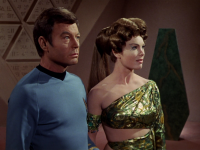
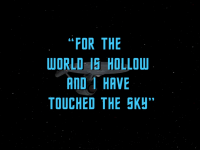
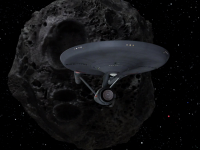
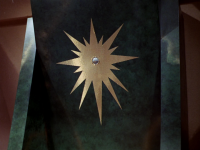
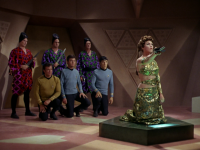
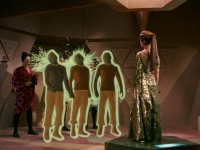
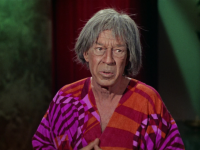
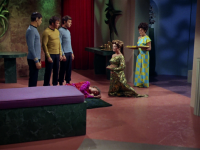
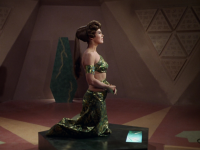
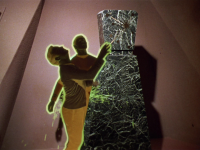
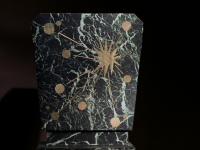
Star Trek TOS - 3x08 - For the World Is Hollow and I Have Touched the Sky
Originally Aired: 1968-11-8
Synopsis:
An inhabited asteroid is on a collision course with a Federation planet. [Blu-ray] [DVD]
Filler Quotient:
3, bad filler, totally skippable.
- Pretty lame episode with no significant long term continuity.
Problems
- Several characters during this episode make reference to the "solar system" the alien ship is on course to collide with. This is a common error. The term they were looking for is planetary system. The planetary system we live in is called the Solar System because our star is named Sol. As such, the term "Solar System" is a proper noun, not a generic term.
Factoids
- Jon Lormer, who played the old man in this episode, also played Theodore Haskins in The Cage (and The Menagerie) and Tamar in Return of the Archons.
- This episode has the longest title out of any Star Trek episode.
Remarkable Scenes
- The Enterprise destroying the missiles.
- McCoy revealing that he has a terminal illness.
- Kirk pleading with Natira, explaining to her what her world is.
My Review
A society of people living on a ship disguised as an asteroid from the outside and disguised as a planet from the inside so the people within won't know that it's a ship. A complex and intriguing premise that unfortunately suffers mightily due to the fact that the plot at no point ever answers this simple question from Natira: "Why should the truth be kept from us? Why should the creators keep us in darkness?" Kirk dodged the question and although he was quite busy at the time trying to save her life, I honestly don't think even the writers knew the answer. For some reason it was all set up for the ship's population to be oblivious and that's just the way was. Don't ask why. Knowing why might make the story more interesting, and we can't have that!
While we're at it, let's not ask why we have yet another alien race that looks exactly like humans, why a civilization that clearly was highly advanced 10,000 years ago would voluntarily reduce itself to this, or why the writers decided to afflict McCoy with both a terminal illness and a marriage only to erase both by the end of the story. Oh wait, I already know the reason for that last one. On Star Trek, the writers have an aversion to main characters growing, changing, living, and dying. This show could learn a thing or two from a soap opera.
Granted, I wasn't the biggest fan of McCoy's romantic scenes with Natira anyway. They were verbose and, frankly, pretty damn boring. But McCoy grappling with a terminal illness and looking to make a change in his life so he can maximize the enjoyment of his final days was a compelling piece of drama. Had it not been manufactured drama with a manufactured cure, it would have been far more compelling. But even with that, there was at least one terrific scene enabled by the manufactured drama. When Kirk, Spock, and McCoy were struck down by the shock and McCoy was the last to wake up, I greatly enjoyed McCoy trying to play off his weakness only to be rendered speechless when Kirk informed him that "Spock knows." Wonderful character moment.
But outside of its intriguing premise and some decent, albeit forced character drama, this episode has little to offer. It's not the worst episode of Star Trek, but it's far from the best.

The following are comments submitted by my readers.
Not bad at all. I think I'd give it a 7.
Things I liked:
-The idea of a controllable asteroid
-McCoy having a new perspective on life
-Spock and Kirk breaking into a sacred temple without much concern (it was funny somehow)
-The old man who had the guts to climb the mountain
-Kirk and Spock discussing the prime directive before interfering. At least they considered the ramifications
-The science in the episode didn't have too many problems
Things I didn't like:
-Putting control devices on people in Trek is way overdone
-Curing a disease within the last minute, that's overdone too
-How Spock was able to predict the asteroid's collision just by being read the coordinates. I know he's smart, but c'mon, at least use the computer to double check.
-I tend to dose off when I watch this episode. The scenes between Mccoy and the woman are very calm (I wouldn't say boring) and the music is very soft
Other thoughts I had:
-I sure hope Spock shared the "cure" to Mccoy's disease with Starfleet, since I imagine the same disease is killing millions of people each year. Actually, he needs to have a conference call with every doctor in the quadrant at once. "I have the cure!"
-The updated Blu-Ray edition has some nice shots of the missiles (at the beginning) and of the asteroid. I think some of the special effects within the "chamber" were also cleaned up
-Does every species in the galaxy have the same code of conduct when it comes to hospitality? Just about everyone Kirk and Spock meet offers food and drink at some point. I do realize it's an easy way to set up a dialogue scene and to introduce the characters.
Only one barrage of missiles? And a small one, at that. Pretty lame defense. And it simply draws attention to the source. As far as I can tell, the Enterprise was minding its own business, so why attract "trouble"?
I cringed every time Natira said "the people."
At the end when Kirk and Spock find Natira on the floor in the Oracle Room and then proceed to get the book, why doesn't the Oracle just zap them again? Instead you get a short duration of medium-strength wind (inside a closed room!) and heating elements turned up full blast. Aside from that, Mr. Oracle suddnely becomes quiet and impotent for no apparent reason. And after Spock turns off the toaster coils, wouldn't it take a while for the room to cool down?
Perhaps this story is to show what happens, or what it's like, when all you have is dogma, when you're not allowed to ask questions, and so forth. There'd be endless ignorance and no science. Galileo vs. The Church comes to mind.
Why the dogma? Perhaps to maintain control and keep order.
Note when Natira says, "Is truth not truth for all?" Interesting that the Oracle comes up with the idea of multiple truths: "their truth" and Yonada's truth, instead of just saying that our heroes are wrong. (Perhaps Mr. Oracle is just being polite!)
McCoy: "Press the three lower planets on the left-hand side." Obviously this is Yonada's version of Ctrl+Alt+Del.
As far as main characters dying for credibility's sake, I'd rather see them again next week (JMHO). Although I did like the idea of McCoy changing his life, we need him back next week. The show would suffer immensely without him.
Furtermore, credibility in Star Trek is already stretched way beyond reason: gravity everywhere, all the time, in heavily damaged ships, in ships playing dead, on asteroids, inside asteroids, people falling over when the ship "tilts"; ignorance of the existence of inertia (Newton's First Law), as in the crew not being splattered against the wall during the incredible accelerations of the ship (I imagine that the artificial-gravity machine somehow takes care of that, even though it has trouble with "tilting" during an attack), and needing engine power just to keep going at a steady speed (there's no friction in space!), "drifting," "stopping" (okay, stopped relative to the galaxy); faster-than-light travel; multiple earths; an "energy barrier" at the edge of the galaxy that one somehow can't just go above or below; psychic power, "mind transfer," entities made of "pure energy"; etc. So what's adding on just one more? As much as I cringe at all the bad science, I love the show. Even the bad episodes have their moments. And never forget the fun aspect of the show.
Just a quick correction to Mr. Feldman--your example of Galileo "vs" the Church is a commonly misunderstood one and doesn't really apply to this situation. I don't want to argue about it on here, but you can read more here: http://www.catholic.com/tracts/the-galileo-controversy.
I like this episode. I'm always pleased with the ones that have relationships, rather than action, at their core, and this one had some good moments.
--Chapel arguing with McCoy at the beginning. --McCoy telling Kirk about his illness.
--Kirk unsure how to treat McCoy once he found out about the illness.
--Spock asking, "May I ask precisely what is troubling the doctor?"
--Kirk telling Spock about the illness. Spock's grave "Yes, I know of it, Captain," with the raised eyebrow.
--Jim's eyes downcast as he says seriously, "Then you know that nothing can be done."
--Spock resting a hand on McCoy's shoulder as he came out of unconsciousness. McCoy's look, not at Spock, but at Jim, and Jim admitting, "Spock knows."
--Love the little old guy. When McCoy says about the "energy powder," "Tastes like an ancient herb derivative," I thought that the powder would contain the cure--which of course was coming.
--McCoy asking, "Is that too much to ask?"... that he live out his last year with some happiness. And really, is it?
There were definitely problems, as there always are. My biggest one is that McCoy and Natira are married, but they just decide to go their separate ways at the end. It's nice, though, that Kirk arranges for them to have some time together. But a wife, for heaven's sake, isn't the same thing as one of Kirk's alien girls. Do we ever hear about her again?
Strider wrote on 2012-06-27 at 8:24am:
"Just a quick correction to Mr. Feldman--your example of Galileo "vs" the Church is a commonly misunderstood one and doesn't really apply to this situation. I don't want to argue about it on here, but you can read more here: http://www.catholic.com/tracts/the-galileo-controversy."
And Mr. Strider, you can read more about it here: http://en.wikipedia.org/wiki/Galileo_affair.
AEF
More on "For the World Is Hollow . . ."
At the beginning of the show, Natira and some guards apprehend our heroes on the surface of the asteroid. How can they not know from this that their world is not limited to what's inside the asteroid? And again when two of the guards leave Kirk, Spock, and McCoy on the surface? At one point Kirk says to Natira, "You are living inside a hollow ball." She was on the surface outside the hollow ball at the beginning of the episode! She needs to be told this?
How did they round up "their best people" and put them on this disguised space ship without their knowing what's happening? Did they zap them with dumb-down rays? That could be how they got them to accept the instruments of obedience, too, and thereby the Oracle dude. And all this was done by the lesser people? (Okay, maybe it was done by their second-best people.)
When Spock points out that letting the Yonadans know they are on a space ship would violate the Prime Directive, Kirk points out the obvious that it's better than allowing their destruction and that of the 3 billion inhabitants of Darren 5. On the other hand, only Natira needed to be told, but they'd have to put the Oracle dude back in charge. But "the people" would find out in the end anyway.
A similar problem happened in TNG in the episode "Homeward", but with the captain favoring the extinction of a people in order not to violate the Prime Directive, possibly even with a religious-like, unquestionable belief. Regardless, I don't see the logic in allowing an entire civilization (and in the case of this TOS episode, a second totally unrelated civilization!) to be wiped out for sake of the Prime Directive. Extinction interferes with the normal and healthy development of the alien civilizations. While extinction is normal, it's certainly not healthy! Kirk got it right.
AEF
To answer the point raised in another post, the landing party do not land on the outside of the asteroid, they beam down to a point inside the asteroid (this is stated in the dialogue). From that point the inner surface of the hollow asteroid looks just like the sky. Presumably it's some kind of giant display screen - later on Natira says she can see the sun and the stars, presumably these are images displayed on the screen/sky. This is also the reason why it is possible to touch the sky if you climb a high enough mountain.
"The World Is Hollow . . . post 3"
Reply to Simon's post regarding landing on the asteroid
Thanks for your response, but I checked it out and still think they landed on the surface.
SPOCK: Asteroid has an outer shell, which is hollow. It surrounds an independent inner core, which has a breathable atmosphere. Sensors read no life forms.
My interpretation of this is that the surface is the outer shell. Either way there must be two breathable "atmospheres", and Spock is referring to the inner of the two.
(Dead flat soil, rocky outcrops, orange sky.)
MCCOY: You'd swear you were on the surface of a planet.
SPOCK: One fails to see the logic in making a ship look like a planet.
This sounds to me like they're on the surface of the asteroid.
After being captured, our heroes are led underground. What is the point of this if they were already inside the asteroid? There'd be two artificial skies and two artificial suns. Seems ridiculous to me.
[A side note: Since the inside of the outer shell (in my interpretation) is the Yonadan sky, our heroes descend through the tube buildings right through it! That must be at the top of the mountain no one is allowed to climb. The whole thing is just plain ridiculous.]
Add to this there bring near-Earth-strength gravity on the surface of the asteroid (in my interpretation), asteroids being too small to have appreciable gravity, and near-Earth-strength gravity inside the asteroid, in a arbitrary direction, no less (although the latter is a matter of course in Star Trek). Add to that the fact that asteroids are not massive enough to hold onto an atmosphere, and it's all just plain ridiculous.
Bottom line: Either of our interpretations leads to a ridiculous asteroidal environment.
AEF, aka betaneptune
Am I missing something? How does Spock know what the Fabrini language looks like if the Fabrini world was destroyed by a nova approximately 10,000 years ago?
At Alan Feldman:
Simon is right, you are mistaken. The people live underground. There is not a "second sky" inside the second hollow shell. Spock or someone else mentions that they began to live underground on their planet before they launched the asteroid ship. So it makes sense that they would still live "underground" on the asteroid ship for either continuity of lifestyle or to keep up the ruse.
At Rick:
Yes, they live underground. How does that conflict with what I said?
OK, so they live underground. At the beginning of the episode they come out of those tube things. Are the tube things underground, too? If so, how? So how does that work with the sky?
As best as I can tell, the tube-things are not underground, and when Natiria and company emerge from them and fight with our heroes we see a sky. Then they go underground and see what certainly must be a different sky!
Recap: When they land on the asteroid they are under a sky. They are captured and led underground. And even though we don't see it, I assume there is an underground sky. You're now telling me that these are one and the same sky? How?
No one is right on this because the whole thing is ridiculous and screwy to begin with.
The only sensible point of the episode seems to be how bad things happen when you're not allowed to question things and are forced to accept dogma.
Feldman,
I don't know how to explain it to you if you don't already get it, but there are not two skies. There is one sky. They beam down to the surface with the sky above them. Then they go "underground" (from the perspective of the asteroid people). There is I sky in that underground area. Rewatch it, you are missing something, it all makes sense.
To Kethinov: the episode states pretty clearly that the civilization reduced themselves to this because their star was about to nova. I imagine that the civilization survived elsewhere through colonies and by integrating into other civilizations, but it is certainly reasonable that the remaining people on the planet constructed this ship/asteroid in order to maintain their underground lifestyle and overall way of life. That also explains the secretive nature, along with the fact that maybe they thought it was easier for a civilization to handle a 10000 year trip under the lie they created.
Per usual, good sir, you grasp at straws to tear down TOS episodes. I really dont think you understand the pacing and plotting of older television. I understand your reverence for the serialization of television, but a lot of us like Gunsmoke, Bonanza, TOS, and Law&Order more than the serialized shows. Doesnt make you or us right or wrong, but I think it is a little disingenuous to present your side as objectively correct so often.
As for the pacing, it is entirely about what you are used to and what you prefer. That is in a vacuum of course, as individual episodes from any era can be too slow or too fast, but since you continually say that TOS episodes are too slow without ever saying a single one was paced too fast (I dont believe), that clearly shows a bias.
Long live classic television!
Of course, it has ALL the traditional problems of Star Trek!
Who cares in this case? At least... to me anyways...
I liked the tenderness of Natrira and McCoy, and his 'vulnerability'?
My biggest problem is the timelines... This ship had been cruising for 10,000 years!!! Humanity has only been 'intelligent' for 5K, tops from this time period!!!
So how would humans know about a society cruising through space after leaving a star that was known to have gone supernova 10k yrs prior?
I understand that they have FTL abilities, and thus, time!
... but throw me a bone here!